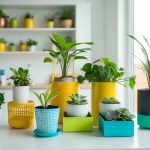How to Make Your Own Cleaning Products: Simple and Cost-Effective Methods
Day-to-Day Cleaning Tips and Hacks
Efficient cleaning solutions and clever hacks can make everyday household maintenance simpler and more effective. Knowing the right techniques for dusting, managing daily messes, and keeping the air fresh are essential for a clean home without the use of harsh chemicals.
Dusting and Polishing Made Easy
Regular dusting is crucial to maintaining a clean home. Using a microfiber cloth can make this task quicker and more effective. A good technique involves lightly dampening the cloth to better capture dust particles.
When dusting surfaces like shelves or tables, it’s important to start from the top and work your way down. This prevents settling dust on areas you’ve already cleaned. For polishing wooden furniture, a homemade mixture of olive oil and lemon juice works well, ensuring a natural shine without any harmful chemicals.
Always remember to dust electronics with a microfiber cloth to avoid static build-up and scratches. Ceiling fans and vents should be dusted weekly to maintain air quality.
Dealing with Daily Messes
Kitchen counters are often a hotspot for daily spills and crumbs. A homemade all-purpose surface cleaner, made from equal parts water and white vinegar with a few drops of essential oil, is effective and eco-friendly.
For bathroom maintenance, a daily shower spray made from white vinegar, dish soap, and water helps prevent soap scum and mildew buildup. Spraying this mixture after each use keeps your shower clean with minimal effort.
In dining areas, promptly wiping down tables and chairs after meals prevents the buildup of sticky residues. Quick clean-ups using a damp microfiber cloth can save time in the long run, making deep cleaning less frequent.
Eco-Friendly Air Freshening
Keeping the air fresh without chemical-laden sprays can be achieved with natural methods. Simmering a pot of water with citrus slices, cinnamon sticks, or cloves releases a pleasant aroma into the home.
Live plants, such as spider plants or peace lilies, not only enhance the décor but also improve air quality by filtering toxins. For a quick refresh, a homemade air freshener can be made by mixing baking soda with a few drops of essential oil in a spray bottle.
Another effective method is placing bowls of activated charcoal around the house. This not only removes odors but also absorbs moisture, maintaining a pleasant indoor environment.
Safety and Precautions for DIY Cleaners
When making your own cleaning products, always prioritize safety. Some natural products can still be harmful if misused.
Essential oils and concentrated oils may be effective but can also be toxic if ingested or used incorrectly. Always store them out of reach of children and pets.
Label all homemade cleaning solutions clearly to prevent any accidental misuse. Use airtight containers to keep the products fresh and maintain their efficacy.
Test a small area before applying any DIY cleaner to a large surface. This ensures that the solution does not damage the material.
Proper ventilation is crucial. When using essential oils in your recipes, make sure the area is well-ventilated to avoid respiratory irritation.
Wearing gloves can help protect your skin from any potential irritants, especially when handling concentrated substances.
It’s important to do thorough research and use reliable resources. Websites might include affiliate links to products; ensure these sources are reputable before making purchases or using recipes.
Lastly, ensure that you’re not mixing products that can create harmful reactions. For example, vinegar should not be mixed with bleach due to the toxic fumes that can result.



